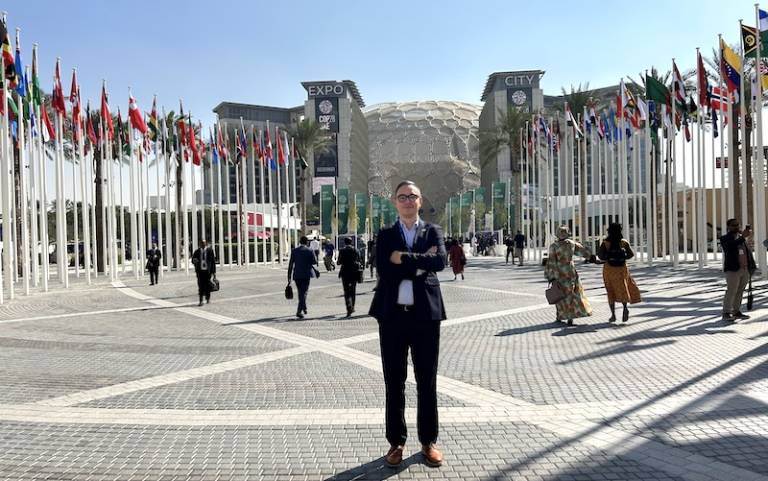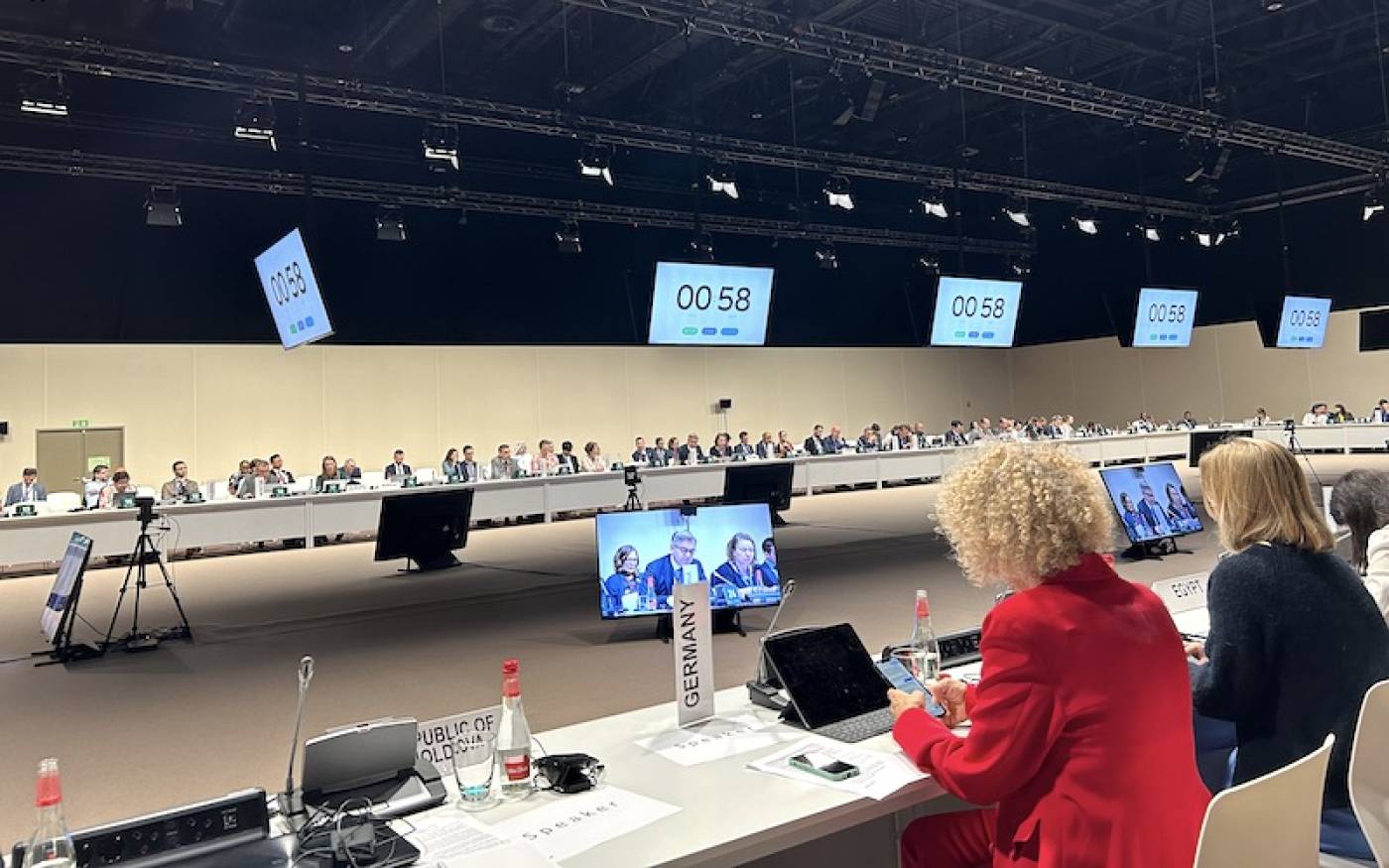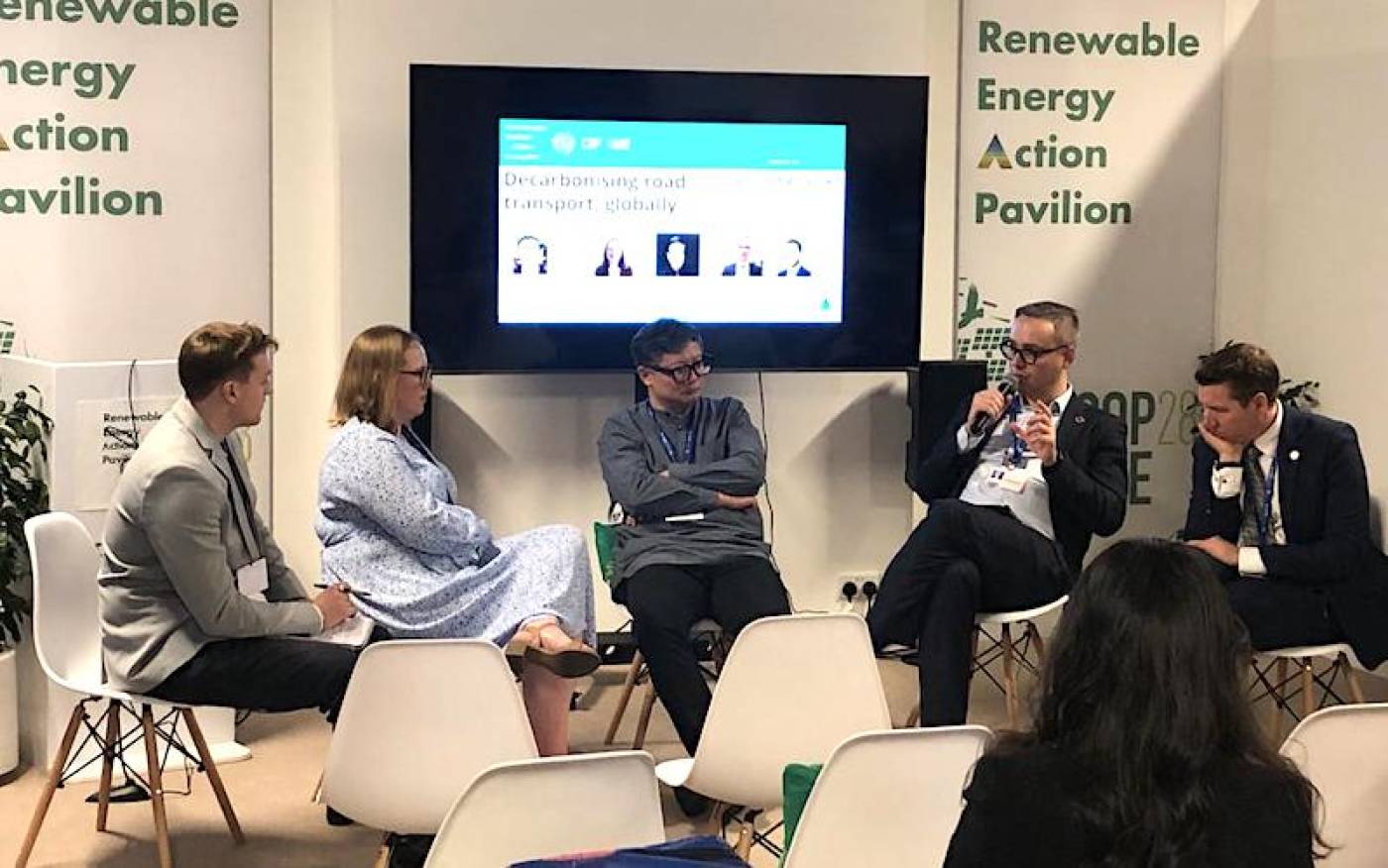A climate researcher’s experience of COP28
12 January 2024
UCL Institute for Sustainable Resources researcher Yaroslav Melekh writes about the good, bad and indifferent of a global convention in a critical time

Attending COP28 this year was both an exciting and frustrating experience – overwhelming due to the mind-boggling scale, anxiety-inducing due to ‘FOMO’, but also low in optimism at the outset about actionable outcomes. Given that it took place in a petrostate (the United Arab Emirates) and was chaired by Sultan Al Jaber, Head of the Abu Dhabi National Oil Company, many feared that the ambition of the climate agenda was watered down, so every new pledge that came from COP can yet be seen as a positive. Myself, I sought to pursue a few issues at the meeting: international climate finance, energy policy and innovation, and the green recovery of Ukraine.
The personal side of COP28
Attending COP as a researcher gives one a certain level of intellectual freedom to talk freely about the actual science, rather than any government agenda. The IPCC's alarming statement at the outset of the meeting was a sobering reminder: we've already heated the atmosphere by at least 1.1 °C since pre-industrial times, with current trajectories pointing to a worrying 2.9°C increase by 2050. The current warming level is alarming enough, as 2023 was the hottest year since pre-industrial times. Many extreme weather events including forest fires, flooding and polar melting have hit the planet recently. Practically, this may lead to loss of productivity and asset values, triggering economic decline, adverse health impacts, and, more critically, loss of human lives and natural habitats. In sum, the heating of the planet at current levels leads to non-linear impacts and we don’t know how much worse it would be should the atmosphere reach a 2.9°C increase on pre-industrial levels. COP’s Global Stocktake presentation had a very strong message:
“We aren’t where we should be, and we do not have the luxury of (merely) incremental action on climate.
However, despite COP27 bringing underwhelming progress, there were heightened expectations at COP28 for decisive action on fossil fuel phase-out and robust climate finance commitments, not least amidst climate urgency to decrease the 2019 global emissions by 28-43% by 2030. Indeed, the summit began in a spirit of hope thanks to the jumpstart of the Loss and Damage Fund by initial pledges by a number of countries to contribute over $700 million, and also their $175 million ‘top-up’ of the UN Adaptation Fund.
Negotiations on the New Collective Quantified Goal (NCQG) on Climate Finance
The international climate finance system was discussed in detail during the High-level Ministerial Dialogue (HLMD) on New Collective Quantified Goal (NCQG) on Climate Finance, which I joined as one of the few ‘Observers’. The objective of the Dialogue was to devise a more holistic and transparent approach to quantification of climate finance goals. Developing countries challenged the inadequacy of the $100 billion pledge by 2020, declaring it insufficient and tardy, sowing distrust. There was a call for ‘science-based’ needs assessment, incorporating the increased scale of the transition needs and the global rise of costs, and the mainstreaming of the means of implementation for climate adaptation and loss & damage. The discussion suggested that the green transition in emerging markets (excluding China) might need approximately $2.4 trillion a year by 2030 (an equivalent of circa 2.5% of value of the global economy), far above the current (only partly-achieved) pledge of $100 billion.
Those mind-boggling numbers were presented purposefully, to shape the narrative about the economics of climate action in a positive way. This resonates with our approach in the EEIST project, rethinking the transition not as ‘costs’ or ‘burden-sharing’, but as ‘investment’ and ‘economic opportunity’. To that end, many developing countries have called, firstly, for deeper reform of the international climate finance system. Secondly, contributors to bilateral donor funds also underscored the key role of the private sector, with public and multilateral funds acting as catalysts, encapsulating the idea that, ‘Multilateral development banks (MDBs) can fund billions, the private sector can fund trillions’. Therefore, urgent reforms for MDBs are imperative, including simplified fund access and a tripling of bilateral funding by 2030. Thirdly, the role of credit-rating agencies was brought up, arguing that their conventional methodology has driven significant risk premiums or even leaving some countries with almost no access to capital. This highlights a disparity between perceived and actual risks in developing countries, underscoring the need for innovative financial mechanisms and a strategic role for MDBs in reducing the costs of capital, that often delays transition due to lower deployment of green technologies per unit of capital.
Even though the COP Presidency events were at the core of public scrutiny, I found that real knowledge-sharing and networking took place in the side events. In fact, while many were frustrated about how the official negotiations were progressing, attending country and multilateral pavilions demonstrated how academics, businesses, and civil society can make a positive difference with bottom-up initiatives and partnership before asking governments to step in.

Illustration: Image from the COP28 High-level Ministerial Dialogue on New Collective Quantified Goal on Climate Finance
Bringing UCL research to bear in COP – the future of transport and the leadership of the World Bank
At COP, I gave a presentation of the Economics of Energy Innovation and System Transition (EEIST) project, focusing on new economic thinking (NET) about the green transition. I also discussed the future of transport decarbonisation as part of a panel of industry representatives and policy advisors at the Renewable Energy Action (REA) Pavilion. This was an opportunity to present the results of our recent policy brief on the policies for the tipping point in the transition to zero-emission vehicles. Lastly, I made a presentation at the Ukrainian Pavilion about war-time reconstruction efforts during the Future of Ukrainian Cities in Focus event, sharing my first-hand experience at Sida working on the OECD HDP (humanitarian-development-peace) nexus response to Ukrainian municipalities’ needs.
Beyond formal engagements, my time at COP was intellectually enriching, offering valuable, often unexpected connections for our research at UCL, e.g. whilst still orienting myself in the huge site on day one, I found myself attending the fireside chat with the World Bank leadership and the IMF, focusing on fossil-fuel phase ‘out’ or ‘down’ and the role of Carbon Capture and Storage (CCS) in the power sector. This made my day, as just before going to COP I was researching this area, leading a background paper on energy transition technologies and industrial decarbonisation for the forthcoming World Bank’s World Development Report on the feasibility of the transition from coal to gas, and CCS solutions in the power sector vis-à-vis emerging energy storage technologies. The panel's argument to ‘phase ‘down’ fossil fuels rather than ‘out’, citing the growing power system balancing needs due to rapid uptake of renewables, contrasted starkly with our findings. Nevertheless, this encounter underscored the vital role of independent research and scientific evidence in informing the policies and strategic decision-making of multilateral institutions.

Illustration: Yaroslav Melekh appearing as a panellist at a COP28 Transport event
Life after COP
Having most of the global sectoral experts and stakeholders in one place, addressing the vital policy and research questions, makes attending COP highly rewarding for a researcher. The world of COP’s side events is inspiring but quite different to the official negotiations. One may grow frustrated regarding formal outcomes such as the restrained language on fossil fuels, yet it’s the first time they have actually made it into the text. Specifics on ‘means of implementation’ such as climate finance were also limited. Yet, COP still managed to deliver ‘something’ – principally, the Loss & Damage Fund was agreed with initial pledges, and countries agreed to the target of tripling renewable energy capacity by 2030. The key takeaway? Be patient in your researching life, moderate in your expectations, and exciting things may present themselves.
 Close
Close

